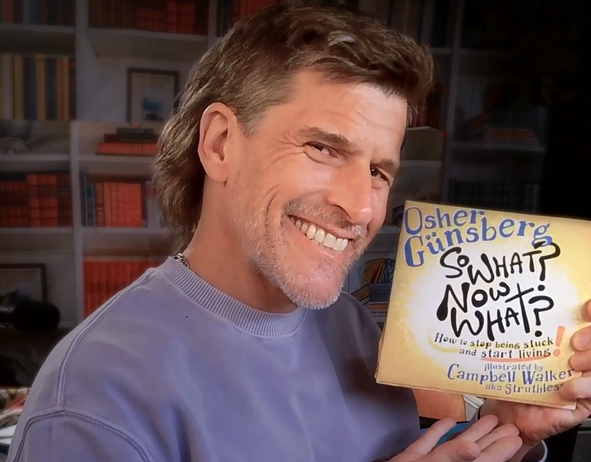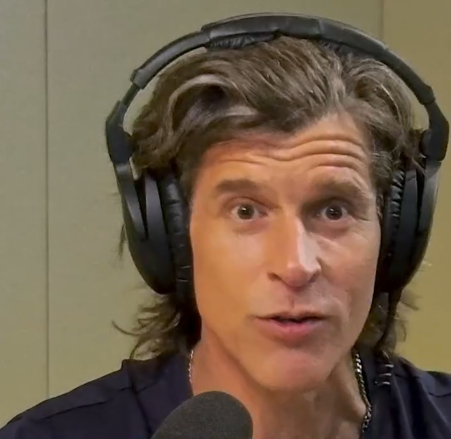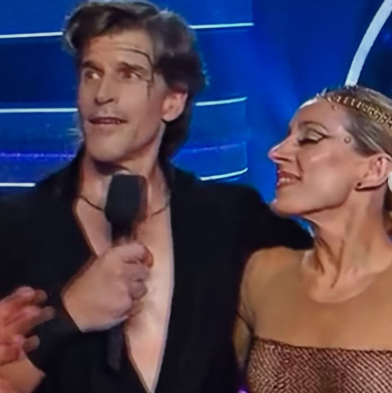
Osher Günsberg likens the Australian radio industry today to the taxi industry after Uber first launched here.
“You’ve probably had a good couple of years to understand this was coming and adapt your business models accordingly,” he says.
“But much like television, I don’t think that happened.”
Osher offers up this most interesting analogy whilst chatting to me about radio on the latest episode of the Food Bytes with Sarah Patterson podcast, which drops this Thursday.
An early red flag came when the big internet companies started buying entire libraries of content.
“You could see where it was going,” says Osher. “But people kind of stuck their fingers in their ears and went to lunch and thought ‘Nope! This is how it’s always gonna be!’”
“And it wasn’t.”

Working in radio himself at the time, Osher says “I was too busy trying to be as good as I could as a broadcaster to look up and notice share prices and ratings and things like that.”
“By the time I looked up, I was the only one left.”
Whilst Osher hadn’t specifically planned on a radio or television career, he knew from a young age that he’d end up doing something which connected with people through performance.
Aged five, he remembers standing on a coffee table, conducting the orchestra that was playing over the TV test pattern.
“It was the hottest show on television in Brisbane in 1979, because it was on all day … on three separate channels!” he laughs.
Music came before radio, with Osher a regular fixture on Brisbane’s band scene.
At the age of of 20, he started working as a Black Thunder pilot and hosting mid-awn shifts on B105.
“I kind of fell into radio and just happened to be good at it, because I was able to use all the skills and knowledge from connecting with an audience in front of me in a crowd to connecting with people on a microphone,” he says.
“I was very, very lucky that I just happened to be the right guy in the right place in front of the right person who needed what I had.”
“That was it. There was nothing particularly special about me at the time.”
Once he had his foot in the door, Osher threw himself into radio.
“I probably worked harder than other people and just committed myself to not being terrible and actively seeking out how I could have been better,” he remembers.
“People seemed to like what I did, and I just fell upwards.”
He certainly did.
Not only did Osher go on to host classic radio programs including Take 40 Australia and The Hot Hits, his TV career took off like wildfire.
Osher found himself presenting everything from Channel V’s flagship music request show to Australian Idol, making him one of the most familiar faces in the country.

Of the comparison between radio and TV, Osher says “Radio is very, very structured.”
“If you think about a pop song, there’s the intro, verse, chorus, verse, chorus, bridge, chorus, chorus, fade, out. Radio talk breaks have a similar structure to them”
Being able to transfer the knowledge of how that works was a source of fascination for Osher, who says “I was very much into the art of the broadcasting.”
Osher says at Channel V, he was fortunate to work with the ex-ABC head honchos who were the driving force behind triple j going national.
“They understood there’s a balance between art and commerce.”
“Our bosses – who were legends of the industry, Jacquie Riddell and Barry Chapman – they would just go to war with the board, saying ‘No, we have to do this. We have to take a bus on the road with a satellite dish and go and do a small festival in a field at Dubbo.”
“In radio and television, you do need to have that person who pushes and agitates for that budget and protects the creative part of things, because one can’t exist without the other.”
“You can’t just all be bean counters and go ‘How can we save money here?’ Well, you know … things cost money, man.”

On the day I spoke to Osher, he’d been at The Fox in Melbourne, promoting his new book called So What? Now What? with the brekky team of Fifi, Fev & Nick.
“I got there before everything was open,” says Osher.
“I got out of the lift – and in this modern time, if you don’t have a pass, you can’t get anywhere – and I’m standing there in the hallway and this big, tall fella comes out and he goes ‘Oh hey. How are you going? I’m the Content Director for Triple M. Can I help you with anything?’”
“I said ‘Yes! A job!’” Osher laughs.
Osher Günsberg’s new book So What? Now What? – a guide on how to stop being stuck and start living – is out now.
*Images: Instagram
